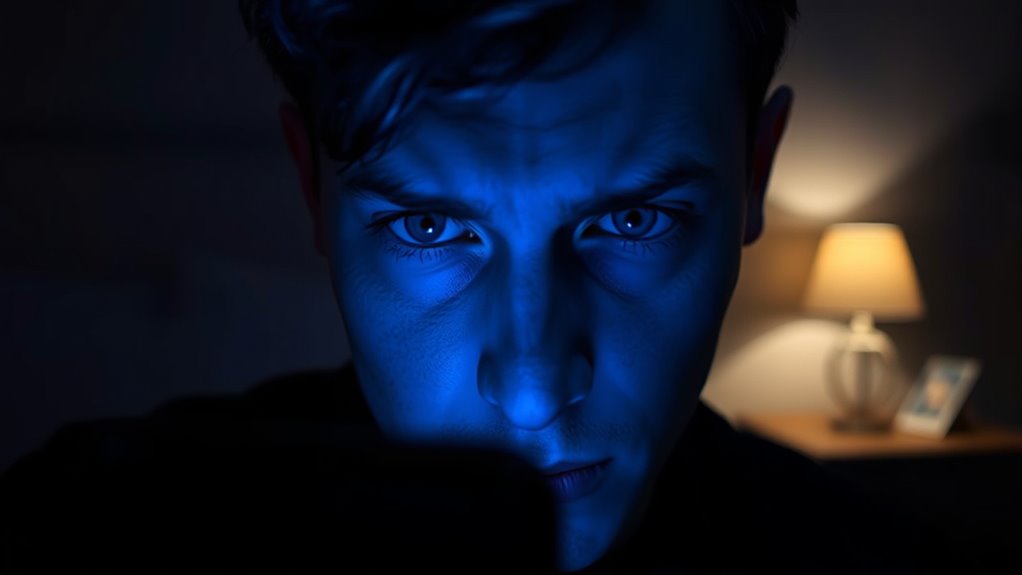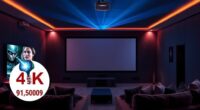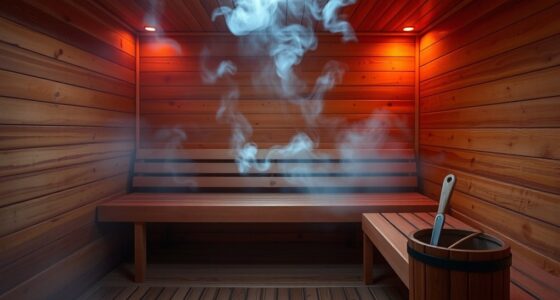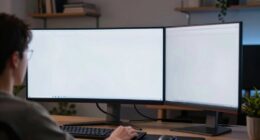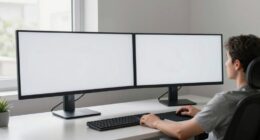Blue light from screens at night suppresses melatonin, the hormone that signals your body to sleep. When exposed, your circadian rhythm gets disrupted, making it harder to fall asleep and reducing sleep quality. Over time, this misalignment can also affect your mood, energy, and overall health. To protect your sleep, try limiting screen time before bed and using blue light filters. Keep going to discover how to keep your sleep cycle balanced.
Key Takeaways
- Blue light suppresses melatonin production, making it harder to fall asleep.
- Exposure to screens at night disrupts the body’s natural circadian rhythm.
- Reduced melatonin levels lead to poorer sleep quality and shorter sleep duration.
- Circadian disruption from blue light can cause fatigue, mood issues, and health problems.
- Using blue light filters or limiting screen time before bed helps protect sleep hormones.
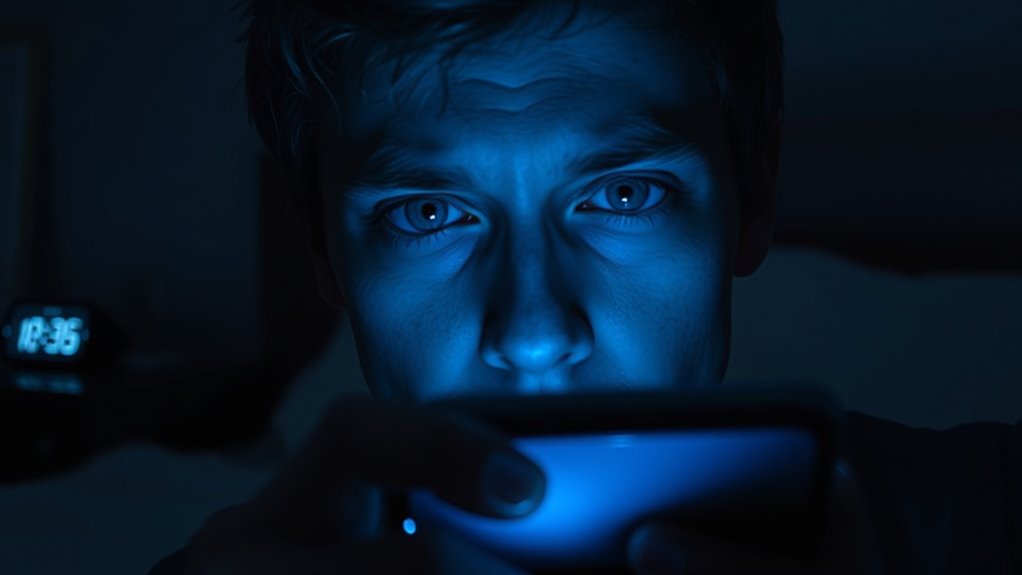
Have you ever wondered how the screens you use late at night affect your sleep? The glow from your phone, tablet, or computer isn’t just a harmless light; it actively interferes with your body’s natural sleep cycle. When you’re exposed to blue light during evening hours, it triggers melatonin suppression, a hormone essential for regulating sleep. Melatonin is your body’s internal clock, signaling when it’s time to wind down and prepare for rest. When blue light hits your eyes, it sends signals to your brain that it’s still daytime, causing a delay in melatonin production. This disruption makes it harder to fall asleep and reduces sleep quality overall. Over time, repeated exposure can lead to circadian disruption, throwing your biological clock out of sync with the natural day-night cycle. This mismatch not only affects how quickly you fall asleep but also impacts the depth and restorative quality of your sleep.
Your circadian rhythm is a finely tuned system, influenced by light exposure and darkness. When blue light keeps you awake longer than you should be, it shifts your internal clock, making mornings more difficult and evenings less relaxing. This circadian disruption can lead to a cascade of problems, including increased fatigue, decreased alertness during the day, and even mood disturbances. It’s not just about feeling tired; your overall health can suffer. Chronic circadian disruption has been linked to issues like metabolic problems, weakened immune function, and even increased risk for certain illnesses. The more consistently you expose yourself to blue light at night, the more your body struggles to maintain its natural rhythm, making sleep less restorative and daytime functioning more challenging.
Recent research on AI vulnerabilities highlights how technological influences like blue light exposure can further disrupt your circadian rhythm, emphasizing the importance of managing screen time in the evening. To protect your sleep, it’s essential to limit blue light exposure in the hours before bed. You can do this by turning off screens at least an hour before sleeping, using blue light filters or glasses, or enabling “night mode” settings on your devices. Creating a bedtime routine that minimizes artificial light encourages your body to produce melatonin naturally, helping you fall asleep faster and enjoy more restful sleep. Remember, your sleep isn’t just about quantity but also quality, and avoiding blue light in the evening is a simple yet effective way to support your circadian health. When you give your body the darkness it needs, your internal clock can reset, leading to better sleep, improved mood, and overall well-being.
Frequently Asked Questions
Can Blue Light Exposure Affect Eye Health Long-Term?
You might wonder if blue light exposure affects your eye health long-term. It can cause eye strain and potentially contribute to retinal damage over time. Constantly staring at screens exposes your eyes to high-energy blue light, which may increase the risk of macular degeneration. To protect your eyes, take regular breaks, use blue light filters, and wear protective glasses, especially during prolonged screen use.
Are There Specific Times Before Bed When Blue Light Is Most Harmful?
This is the most vital time to protect your sleep! Evening exposure, especially during pre-bed hours, can be more harmful than you think. Using screens just before bed tricks your brain into thinking it’s daytime, sabotaging sleep hormones. To keep your sleep quality excellent, try to avoid blue light at least one hour before bedtime. Your sleep will thank you for this simple, powerful change!
How Does Blue Light Impact Melatonin Production in Different Age Groups?
You might notice that blue light impacts melatonin production differently across age groups. In children and teens, developmental sensitivities make them more vulnerable, disrupting their sleep cycles. Adults experience an age-related melatonin decline, so blue light can further reduce melatonin levels, making it harder to fall asleep. Understanding these differences helps you protect your sleep, especially if you’re in an age group with heightened sensitivity or decline.
Do Certain Devices Emit More Blue Light Than Others?
When comparing devices, you’ll notice some emit more blue light than others, especially smartphones and tablets. Screen brightness plays a big role; higher brightness levels increase blue light exposure. Devices like e-readers with warm lighting emit less blue light, making them better for nighttime use. To protect your sleep, opt for devices with lower blue light emissions and lower screen brightness, or use blue light filters and night mode settings.
Can Wearing Blue Light Blocking Glasses Fully Prevent Sleep Disruption?
You wonder if wearing blue light blocking glasses can fully prevent sleep disruption. While their effectiveness evaluation shows they reduce blue light exposure, they might not completely block all wavelengths or eliminate sleep disturbances. Wearable technology, like glasses, helps mitigate blue light’s impact, but habits like limiting screen time before bed are also essential. So, glasses are helpful but shouldn’t be relied on alone for perfect sleep hygiene.
Conclusion
So, it’s no coincidence that your late-night screen time often leaves you restless. As you scroll, blue light quietly sabotages your sleep hormones, making it harder to drift off. Maybe that missed hour of sleep isn’t just bad luck—perhaps it’s a signal to put your device down earlier. When you prioritize winding down, you give your body a chance to reset. Sometimes, the simplest choice can bring back peaceful nights and better mornings.
